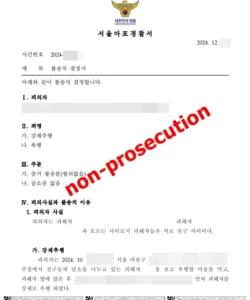On April 25, 2024, the Korean Legal Reserve of Inheritance system (유류분), which guarantees surviving parents, siblings, and children, a minimum portion of their inheritance share regardless of the wishes of the deceased, was ruled unconstitutional by the South Korean Constitutional Court. The Legal Reserve of Inheritance system of the Korean inheritance law ensured that surviving family members who had a right to inherit would receive at least a certain amount of the decedent’s estate.
When the law was first established in 1977, the intention was to prevent inheritance from being distributed only in favor of sons, especially eldest sons, and thus to ensure that wives and daughters would receive their share as well. Since then, it has been pointed out that Korea’s industrialization and the transition to nuclear family households have led to cases where the original intent of the law has been violated.
In addition, the system has shown various flaws, as it would grant inheritance to children who did not take care of their parents or, conversely, to parents who suddenly reappeared after a lifetime of neglecting their children, which led to demands for change. The Constitutional Court, which had still deemed the law constitutional until 2013, now made a judgment that is in line with our changing times.
1. Ruling on Legal Reserve of Inheritance for Siblings
Table of Contents
- 1. Ruling on Legal Reserve of Inheritance for Siblings
- 2. Ruling on the Legal Reserve of Inheritance for Children, Spouses, and Parents
- 3. Ruling on Inclusion of Property Gifted during the Decedent’s Lifetime in the Distribution of Reserved Inheritance Shares
- 4. Impact of these Rulings on Inheritance Cases in Korea
Firstly, the Constitutional Court ruled in a unanimous decision that Article 1112(4) of the Civil Code, which guaranteed siblings one-third of the statutory inheritance, was simply unconstitutional. Thus, the provision immediately became void.
The current Korean Civil Code stipulates the minimum shares that children, spouses, parents, and siblings can inherit (statutory inheritance share), and these shares are distributed accordingly in the case that the deceased did not leave a will. However, even if there is a will, children and spouses are still guaranteed half of their statutory share, and parents and siblings are guaranteed one-third. This is called the “legal reserve of inheritance”.
Changes in family relationships, including looser ties between siblings, seem to have played a role in this decision to overturn the provision. The Constitutional Court explained that “it is difficult to find a valid reason for granting a reserved share to siblings even though it can hardly be recognized that they contribute to the formation of the estate.” The concept of “family estate” was valid in 1977, when around 40% of the population were farmers and families farmed together, but a lot has changed since the law was first introduced.
2. Ruling on the Legal Reserve of Inheritance for Children, Spouses, and Parents
Additionally, Article 1112(1-3) of the Civil Code, which determines the reserved inheritance share of children, spouses, and parents, was also deemed incompatible with the constitution.
The Constitutional Court still acknowledged the constitutional legitimacy of the inheritance system in terms of its intent of maintaining family ties and ensuring the welfare of the surviving kin. However, it was deemed unnecessary to distribute a guaranteed amount of inheritance to heirs who had behaved “immorally”. The Constitutional Court therefore ruled that the respective provisions were unconstitutional, since they did not separately examine the reasons behind why an heir has been denied an inheritance. It was argued that “guaranteeing a right to a legal reserve of inheritance for heirs who had showed neglect or abusive behavior towards the decedent, such as abandoning him/her for a long time, or committing acts of physical or mental abuse, contravenes common sense as well as the sentiment of the general public.”
There was a notable past case which relates to the Constitutional Court’s ruling.
When Goo Hara, a singer of the popular South Korean girl group Kara, died in 2019, her biological mother, who hadn’t been in contact with her for more than 20 years, reappeared to claim her share of the inheritance. However, when Ms. Goo was 9 years old, her biological mother abandoned her children and ran away, only to resurface after 20 years of no contact, when she learned of her daughter’s death and subsequently demanded to receive her inheritance share.
Prior to the Constitutional Court’s ruling on the unconstitutionality, Ms. Goo’s biological mother was entitled to half of the estate, despite the fact she had not cared for her daughter for 20 years.
Article 1000 of the Korean Civil Code stipulates in which order surviving family members inherit a decedent’s estate: the deceased’s children are the first to inherit; if there are no children, the deceased’s parents are second in line; and if there are no parents either, the siblings are third in line. If a decedent has no children and no spouse, as was the case with Ms. Goo, the biological parents become the sole statutory heirs.
Ms. Goo’s estate was to be split 50/50 between her father and her mother. But the mother’s claim to the inheritance left by her deceased daughter after abandoning her for decades lead to public criticism that she did not deserve the inheritance. Despite this, she won her case and eventually received 40% of her daughter’s inheritance.
However, if the Constitutional Court simply strikes the above provisions down based on their unconstitutionality, it would not only cause legal confusion or a vacuum, but it would also contradict the purpose of this very decision. The ruling was not to say that the legal reserve of inheritance system itself is unconstitutional, but to declare that some of the contents of these very provisions that comprise it, are unconstitutional. Therefore, the Constitutional Court decided to continue to deem them as such, until appropriate amendments are made by the legislature by December 31, 2025.
3. Ruling on Inclusion of Property Gifted during the Decedent’s Lifetime in the Distribution of Reserved Inheritance Shares
Even if an heir who has supported the decedent for a long period, or contributed to the formation of the inheritance, is gifted a portion of the property in return, this gifted property is still included in the base property subject to the calculation of the reserved inheritance share (pursuant to Article 1118). This has led to questionable situations in which property had to be returned to a non-contributing heir if he or she claims recovery of their legal reserve of inheritance.
It was now ruled unreasonable for a person who actually supported and contributed to the formation of an estate to have to share that estate equally with a person who did not. The reason being that it would be unjust not to exclude such property that was gifted to contributing heirs, who have supported the deceased or helped to form their estate through cohabitation, providing medical care, etc. for a considerable period of time, from the legal reserve of inheritance.
Consequently, property that has been gifted to family members who have cared for the decedent during his or her lifetime will no longer be subjected to the claim of a reserved inheritance share by other family members.
However, this provision, too, will remain in effect until December 31, 2025, until the law is amended to add grounds for removing it.
4. Impact of these Rulings on Inheritance Cases in Korea
If the law is amended to comply with the recent ruling that the provisions are unconstitutional, inheritance cases will likely become more contentious since questions of whether the legal reserve of inheritance should be denied, whether an heir’s contributions should be considered, etc, which have not been issues in the past, could now become subject to dispute.
While the Civil Code provision regulating the reserved inheritance share for siblings was immediately revoked by the recent ruling, the provisions concerning spouse and immediate surviving heirs (parents, children) will need to be amended by the National Assembly. If the corresponding legislation is not enacted by Dec. 31, 2025, the deadline set by the Constitution Court, it will inevitably lead to chaos.
Inheritance disputes at the courts could increase if the distribution of inheritance is determined based on the contributions of the heirs, while parts of the legal reserve of inheritance system are eliminated. The purpose of the Constitutional Court’s decision is to revise the law to move away from mechanically distributing predetermined shares of inheritance, and to put a focus on the protection of family values.
In other words, the Constitutional Court still recognizes the constitutional legitimacy of the legal reserve of inheritance system as necessary means to protect the welfare of the surviving kin and maintain close family ties but called for legislative improvements to some of the respective provisions under this system, so that it may become more aligned with our current times.




